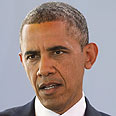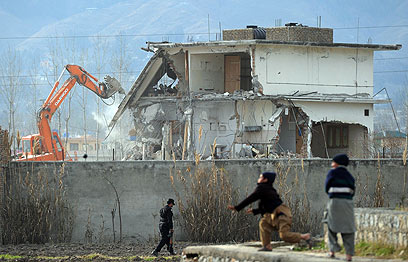
Osama Bin Laden
Photo: AP

Barack Obama
Photo: AFP
Washington - Military files about the Navy SEAL raid on Osama bin Laden's hideout were purged from Defense Department computers and sent to the CIA, where they could be more easily shielded from ever being made public, the AP news agency reported.
The secret move, described briefly in a draft report by the Pentagon's inspector general, set off no alarms within the Obama administration even though it appears to have sidestepped federal rules and perhaps also the US Freedom of Information Act.
Related stories:
- Hundreds in Pakistan pay tribute to Osama bin Laden
- Ex-bin Laden secretary gets life for 1998 embassy bombings role
- Navy Seal disputes prior version of bin Laden death
The one responsible for the data purge from the Pentagon's computers is top US special operations commander, Adm. William McRaven, who wanted to protect the the names of the Navy SEAL personnel involved in the Pakistan raid.

Bin Laden's hideout destroyed by bulldozers (Photo: AFP)
AP has recently filed the Pentagon with a request to peruse said documents but was buffeted when the reply came that no such files exist in the Pentagon's computers.
The Pentagon's response represents a new strategy for the US government to shield even its most sensitive activities from public scrutiny.
McRaven's directive sent the only copies of the military's records about its daring raid to the CIA, which has special authority to prevent the release of "operational files" in ways that can't effectively be challenged in federal court.
The Defense Department can prevent the release of its own military files, citing risks to national security, but that can be contested in court and a judge can compel it to turn over non-sensitive portions of records.
McRaven's unusual order would have remained secret had it not been mentioned in a single sentence on the final page in the inspector general's draft report that examined whether the Obama administration gave special access to Hollywood executives planning a film, "Zero Dark Thirty," about the raid.
McRaven described steps he took to protect the identities of the SEALs after the raid, directing that their names and photographs not be released.
"This effort included purging the combatant command's systems of all records related to the operation and providing these records to another government agency," according to the draft report. The sentence was dropped from the report's final version.
Since the raid on Bin Laden's hideout in Pakistan a member of the Navy SEAL's team who participated in the raid released a book describing the operation, and another SEAL member exposed additional details in a comprehensive interview for Esquire magazine.
However, media outlets and pro-freedom of information NGOs blame the Obama administration of hiding documents pertaining to the raid, and demand their release.
In the first days following Bin Laden's assassination the White House gave conflicting versions of the operation's details. At first it was reported the Bin Laden was armed and even fired toward the SEAL team, and that his wife died in the fire exchange – information that was later revealed to be false.
Afterward, the White House spokesperson related the false data to "fog of war."
- Receive Ynetnews updates
directly to your desktop















